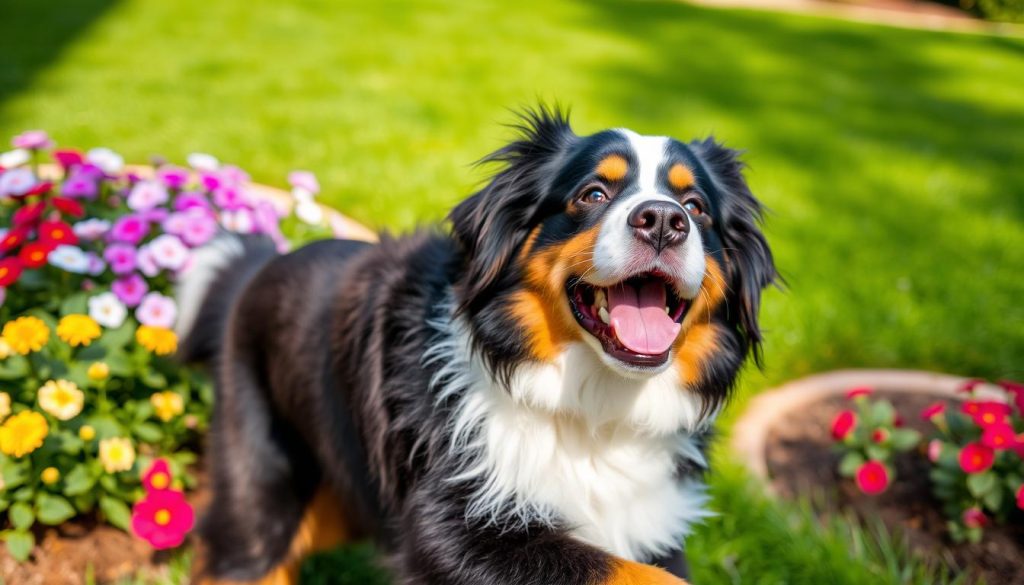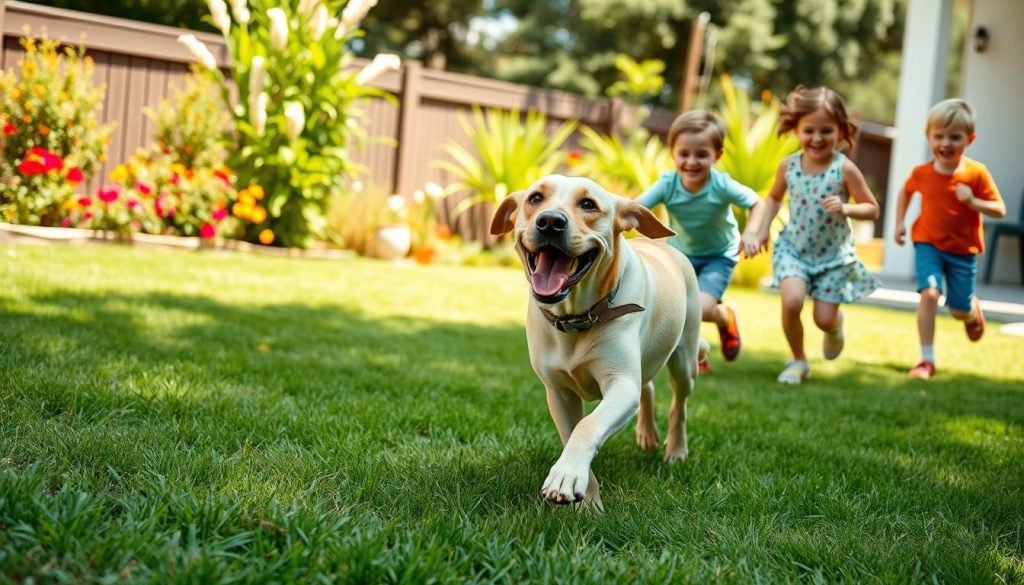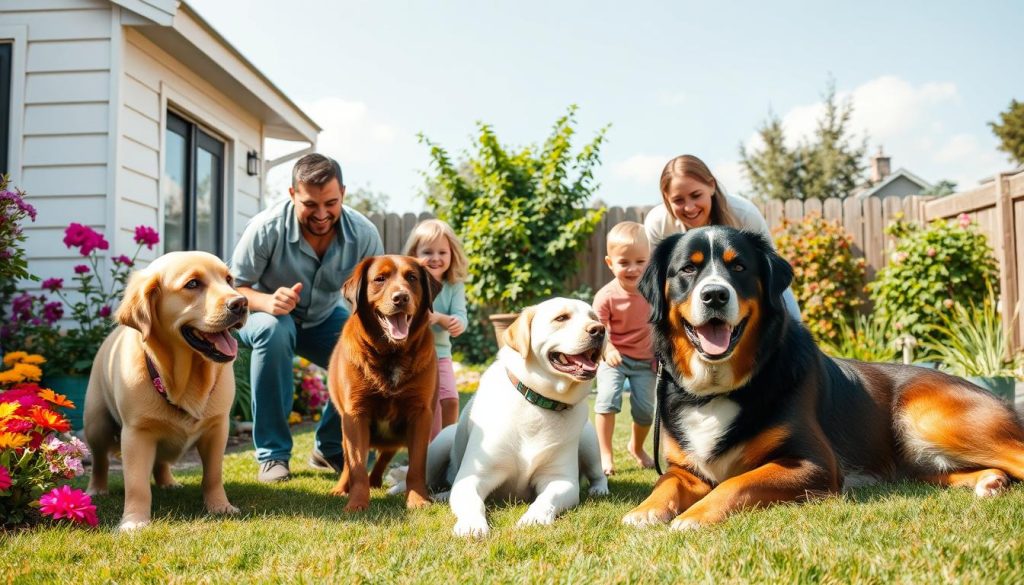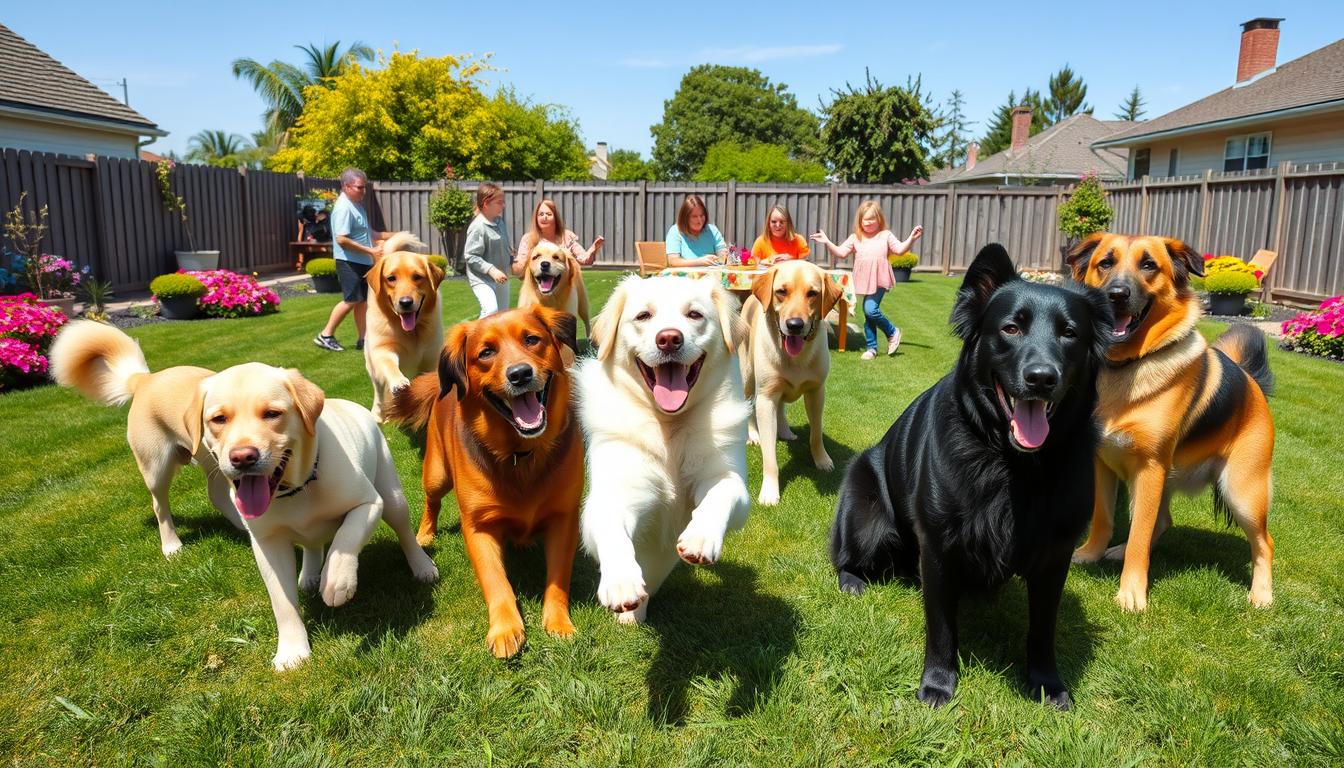Many people choose large dog breeds for their families. These big dogs are gentle and loyal, making great pets for kids. In this article, we’ll look at the top 10 large dog breeds for family homes.
Large dog breeds are friendly and patient. They adapt well to different homes and protect their families. But, pick a breed that fits your family’s lifestyle and energy.
We’ll talk about each breed’s unique traits and why they’re great for families. You’ll learn about breeds like the Labrador Retriever and German Shepherd. Find out which big dog might be right for you.
If you’re thinking of getting a big dog and have enough space, keep reading. We’ll cover the top 10 large dog breeds perfect for family life.
Why Choose a Large Dog Breed for Your Family?
Large dog breeds are often the best choice for families. They are not as scary as people think. Many large dogs are great with kids and bring lots of benefits to family life.
Benefits of Large Dogs in Family Settings
Large dogs, like the Saint Bernard, are calm and patient. They can handle kids’ rough play. They also protect their families, making everyone feel safe.
Large dogs don’t need to run around all day. They like to relax and spend time with their family. This makes them perfect for busy families.
Common Misconceptions About Large Breeds
Large dog breeds are not always big and scary. The Saint Bernard, for example, is very gentle with kids. They are not aggressive just because they are big.
People think large dogs need a lot of space. But, they can live in smaller homes if they get enough exercise and mental play.
Large dogs can be wonderful family pets. They are loyal, protective, and loving. They make great friends for kids and adults alike.
Understanding Large Dog Breeds
Choosing the right dog for your family is important. Large dog breeds have special qualities that make them great for many homes. But what makes a dog large, and how do they fit into family life?

Large dogs usually weigh between 50 to 90 pounds when they’re fully grown. Some giant breeds can even weigh over 100 pounds. Being large isn’t just about weight; it’s also about their sturdy build, strong muscles, and tall height.
What Defines a Large Dog?
Large dog breeds are known for their strength, loyalty, and protective nature. They often make great guard dogs, offering a sense of safety to their families. Despite their size, many large breeds are gentle and loving.
Temperament and Family Compatibility
The Bernese Mountain Dog is a great example of a family-friendly large breed. Bred as working dogs in the Swiss Alps, they are calm and loving. Bernese Mountain Dogs love being around people and enjoy family activities.
When picking a large dog breed, think about their temperament and energy needs. Some large breeds need a lot of exercise and mental challenges to be happy and healthy.
Top 10 Large Dog Breeds
Choosing the right large dog breed for your family is exciting. Each breed has its own special traits, personality, and needs. Let’s look at some of the most loved large dog breeds that are great for families.

Labrador Retrievers are a favorite in the US. They are friendly, outgoing, and love people. These dogs are easy to train and are great with kids and other pets. They need lots of exercise and mental play to be happy.
1. Golden Retriever
Golden Retrievers are also a top choice for families. They are smart, loyal, and friendly. These dogs are easy to train and can do many jobs, like therapy work. They need regular exercise and grooming to keep their coats looking good.
2. German Shepherd
German Shepherds are smart and loyal, making them great for families and work. They are easy to train and protect their families well. They need lots of training and exercise to stay happy and healthy.
3. Rottweiler
Rottweilers are strong and confident, but can be loving family pets if trained right. They are smart and need a firm training approach. They also need lots of exercise and mental play. Early socialization is key to help them get along with strangers.
Personality Traits of Popular Large Breeds
Choosing a large dog breed for your family means looking at their personality. Many big dogs are great with families, especially kids. They make wonderful pets.

Family-Friendly Characteristics
Big dogs like Newfoundlands and Great Danes are known for being gentle. They are friendly, loving, and patient with kids. Their calm and loyal nature makes them perfect family pets.
Energy Levels and Playfulness
Some big dogs are laid-back, while others are full of energy. Labradors, for example, love to play and be active. They enjoy games and going on adventures with their family.
It’s key to match your family’s energy with the dog’s. Great Danes need daily walks and some playtime. Newfoundlands prefer a slower life, enjoying walks and cuddles.
Big dogs love spending time with their families. They enjoy hikes, playing fetch, or just hanging out. They value the time and attention they get from their loved ones.
Health Considerations for Large Breeds
As a proud owner of a large dog breed, it’s crucial to be aware of the health considerations that come with their size. These gentle giants bring immense joy to our lives. But they also require special attention to maintain their well-being. Let’s explore some common health issues and the importance of regular vet check-ups for our beloved large breeds.
Common Health Issues
Large dog breeds, such as the majestic English Mastiff, are prone to certain health issues. These issues are due to their size and genetic predispositions. Some of the most common health concerns include:
- Hip and elbow dysplasia
- Bloat (gastric dilatation-volvulus)
- Orthopedic problems
- Cardiovascular diseases
- Eye disorders
It’s essential to be aware of these potential health issues. Work closely with your veterinarian to prevent, diagnose, and treat them effectively. Early detection and intervention can significantly improve your large dog’s quality of life and longevity.
Regular Vet Check-Ups
One of the most important aspects of caring for a large dog breed is scheduling regular vet check-ups. These visits allow your veterinarian to monitor your dog’s health. They also administer necessary vaccinations and detect any potential issues before they become more serious.
During these check-ups, your vet will assess your dog’s weight, dental health, joint mobility, and overall condition. They may recommend specific tests, such as blood work or X-rays, to screen for common health issues in large breeds. By staying on top of your dog’s health through regular vet visits, you can ensure that your furry companion remains happy and healthy for years to come.
Training Large Dogs
Training large dogs early is key. Breeds like the Cane Corso need consistent training to be good family pets. Start training your dog young to help them learn good behaviors and handle different situations.
Importance of Early Socialization
Early socialization is vital for a well-adjusted large dog. Introduce your puppy to various people, animals, and places. This helps them learn social skills and avoid fear or aggression.
Some ways to socialize your dog include:
- Enrolling in puppy classes
- Arranging playdates with other friendly dogs
- Taking your dog to public places like parks and pet-friendly stores
- Introducing your dog to various sights, sounds, and textures
Effective Training Tips
Consistency and positive reinforcement are crucial when training large dogs. Here are some tips:
- Start with basic obedience commands like sit, stay, come, and heel
- Use positive reinforcement techniques such as treats and praise
- Keep training sessions short and fun to maintain your dog’s attention
- Be patient and consistent with your training approach
- Consider working with a professional dog trainer for breed-specific guidance
Training large dogs is a long-term commitment. By focusing on early socialization and effective training, your Cane Corso or other large breed will become a loyal and well-behaved companion.
Caring for Your Large Dog
Understanding your large dog’s needs is key. Bigger breeds, like the Leonberger, need extra care to stay healthy and happy. We’ll look at nutrition and exercise habits that are vital for your gentle giant.
Nutrition Needs for Bigger Breeds
Feeding your large dog the right food is crucial. Bigger breeds have different nutritional needs than smaller dogs. Choose high-quality dog food made for large breeds. It should have the right mix of proteins, fats, and carbs for their growth.
Always check with your vet to find out how much food your dog needs. This depends on their age, weight, and how active they are.
Regular Exercise Requirements
Large dogs, like the Leonberger, need lots of exercise. Exercise helps them stay healthy, strong, and mentally sharp. Aim for 30 minutes to an hour of moderate activity each day.
This can be brisk walks, playtime in a fenced yard, or swimming if they love water. But, don’t overdo it, especially in hot weather. They can get heat exhaustion easily.
Caring for large dogs is more than just food and exercise. Regular grooming, dental care, and vet visits are also important. By meeting your big dog’s needs, you can ensure they live a long, happy life with you.
Choosing the Right Large Dog for Your Lifestyle
When you’re looking to add a large dog to your family, think about your lifestyle and home. Large dogs need certain things that should match your home and daily life. By considering these, you can make sure you and your new pet will get along great.
Assessing Your Living Situation
First, check out your living space. Do you have a big house with a yard, or a smaller apartment? Big dogs need lots of room to move and play. For example, a Bullmastiff can weigh up to 130 pounds and needs lots of space.
If you live in a small place, think about where you can take your dog for walks and play. Parks or open areas are great for this.
Matching Temperament to Family Dynamics
Next, think about the dog’s personality. Each breed has its own traits that should fit your family’s style. For example, a Bullmastiff is calm and loyal, perfect for families with kids. They are protective and enjoy playing but also like to relax.
If your family loves to be active and go on adventures, a more energetic breed like a Labrador Retriever might be better. They have lots of energy and love to play.
Choosing the right large dog means thinking about your home, family, and the dog’s personality. By carefully considering these, you’ll find the perfect dog to share your life with.

